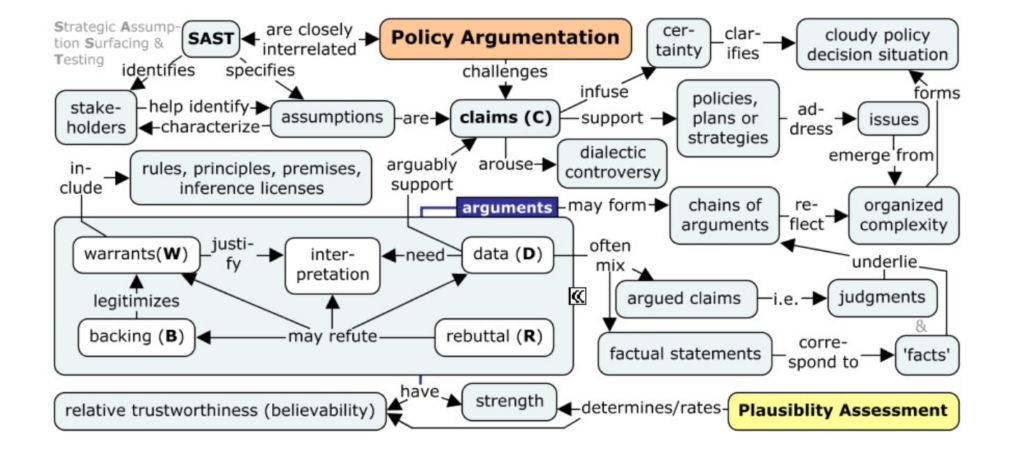
I spend a lot of time in public and expert realms of political dispute. And, one thing I’ve noticed in the last two years is that, in the public areas, supporters of Trump have stopped engaging in rational argumentation about him, but they used to. They’re not even engaging in argumentation at all. They’ll sometimes do a kind of argumentative driveby, popping into a thread that’s critical of Trump in order to drop in some talking point about how he’s a great President, and then leaving. Sometimes they give a reason for refusing to engage in argumentation, and it’s an odd reason (critics of him are biased). This is worrisome.
We’re in such a demagogic culture—in which people assume that the world is divided into fanatics of left v. right—that I have to say what should be unnecessary: not everyone who supports Trump is just repeating talking points. In fact, I can imagine lots of arguments for Trump’s policies that follow the rules of rational argumentation (and I’ve seen them, but not in the public realm). I think Trump’s policies can be defended rationally. Apparently, his supporters don’t.
And that is what worries me.
What I’m saying is that there are people who do just repeat talking points (all over the rich and varied place that is the public sphere) and the kind of people who have always just repeated pro-Trump talking points used to be following advice on how to engage in argumentation, and now they’re not. That kind of Trump supporter has stopped engaging in argumentation at all.
Just to be clear: I mean something fairly specific by the term “rational argumentation” (not how “rational” is used in popular culture, and argumentation, not argument—this will be explained below). While I’m not a supporter of Trump, I do think his policies can be defended through rational argumentation—that is, a person could argue for them while remaining within the rules described below. That means, oddly enough, that I don’t think Trump’s policies are indefensible, but his followers seem to think they are.
That’s worrisome.
I’ve spent a lot of time wandering around the digital public sphere, and thinking a lot about politics. And I’ve come to think that we are in a culture of demagoguery, in which every policy question is reduced (or shifted) to a zero-sum battle between “us” and “them.” That reduction is false and damaging. There are not two sides to any policy issue—there are far more. And our political culture is not a binary.
Personally, I think a useful map of our political culture would be, at least, three-dimensional, and even then you’d have to have different maps for different issues. But that’s a different post.
In my wandering, I’ve noticed that you can see talking points created by a powerful medium that are then repeated by people for whom that medium is an in-group authority. This isn’t a left v. right thing. (No issue is.) The talking points on “get rich fast” shifted when James Arthur Ray killed some people; the same thing happened on the “get laid quick” sites after the Elliot Rodger shooting. The talking points on dog sites changed after a study about taurine came out. I know what Rachel Maddow said on her show without watching her show; the same is true of Rush Limbaugh.
The pro-Trump (like the pro-HRC or pro-Sanders or pro-Stein) talking points used to be a mix of what amounted to tips on what to say if you’re engaged in policy argumentation and what amount to statements of personal loyalty (“s/he is a good person because s/he did this good thing”).
And you could tell what the talking points were by what your loyal pro-Trump or pro-Stein (or pro-raw dog food) Facebook friend (or Facebook group) asserted.
What worries me about the driveby dropping of a pro-Trump talking point and refusal to engage policy argumentation is that it suggests that the pro-Trump sources of argumentative points have abandoned policy argumentation. These people aren’t even trying. That’s puzzling.
What makes arguing in some digital spaces interesting is that people are now often arguing with known entities—I’m watching someone make arguments about Trump whom I watched make arguments about Clinton or Obama.
What I’m seeing, in places that used to have rational-critical argumentation in favor of Trump, is that people aren’t even trying. (So, just to be clear, anyone saying that my argument can be dismissed because I’m not pro-Trump is showing that I’m right.)
What I want to use as the standard for a “rational” argument is van Eemeren and Grootendorst’s ten rules for a rational-critical argument. They are:
-
- Freedom rule
Parties must not prevent each other from advancing standpoints or from casting doubt on standpoints.
- Burden of proof rule
A party that advances a standpoint is obliged to defend it if asked by the other party to do so.
- Standpoint rule
A party’s attack on a standpoint must relate to the standpoint that has indeed been advanced by the other party.
- Relevance rule
A party may defend a standpoint only by advancing argumentation relating to that standpoint.
- Unexpressed premise rule
A party may not deny premise that he or she has left implicit or falsely present something as a premise that has been left unexpressed by the other party.
- Starting point rule
A party may not falsely present a premise as an accepted starting point nor deny a premise representing an accepted starting point.
- Argument scheme rule
A party may not regard a standpoint as conclusively defended if the defense does not take place by means of an appropriate argumentation scheme that is correctly applied.
- Validity rule
A party may only use arguments in its argumentation that are logically valid or capable of being made logically valid by making explicit one or more unexpressed premises.
- Closure rule
A failed defense of a standpoint must result in the party that put forward the standpoint retracting it and a conclusive defense of the standpoint must result in the other party retracting its doubt about the standpoint.
- Usage rule
A party must not use formulations that are insufficiently clear or confusingly ambiguous and a party must interpret the other party’s formulations as carefully and accurately as possible.
These are rules for rational-critical argumentation, so these rules aren’t ways that people have to engage in every conversation.
For instance, I’m not saying that people involved in a discussion can never say that some arguments are off the table, or that people can never refuse to engage with another party (although both of those moves would be violations of Rule 1). I’m saying that, when that rule is violated, the person whose views were dismissed and the person doing the dismissing are not engaged in rational argumentation with each other. They might still have a really good and interesting conversation, or a really fun fight, but it isn’t rational argumentation.
And what I’m saying is that in various places I hang out, supporters of Trump used to engage in argumentation to support their claims, but they’re doing it much less—in fact, not very often. If they don’t do a driveby (one post and out), they say that they won’t argue with anyone who disagrees with them because that person is biased.
Both of those moves—one post and out, and refusing to engage with counter-arguments because the very fact of their being counter-arguments makes them “biased”—is a violation of Rule 1. While they assert that criticizing Trump means a person is so biased that their views can be dismissed, that’s a thoroughly entangled and irrational argument (it’s even weirder when the accusation is “Trump Derangement Syndrome”–it’s weird because many of the people who fling around the accusation of Trump Derangement syndrome still suffer from Obama Derangement Syndrome).
That’s a misunderstanding of what “bias” means and how it functions in argumentation. Of course people are biased—that’s how cognition works—but, if a person is so biased that it’s distorting their argument, then their arguments will violate one of the ten rules. Dismissing a position because the person is biased is a violation of Rule 1. It’s a refusal to engage in rational argumentation.
More important, this move is a rejection of argumentation, and democracy. Rejecting criticism of Trump on the grounds that criticizing Trump shows that the critic is biased is not just an amazingly good example of a circular argument, but a move that makes it clear that the person doesn’t want to listen to anyone who disagrees. Argumentation and democracy share the premise that we benefit from taking seriously the viewpoints of people with whom we disagree.
We are in a culture of demagoguery, in which far too much public discourse, all over the political spectrum, is about how you shouldn’t listen to that person because s/he is biased. And the proof that they’re biased? That they disagree.
If a person is biased, and we are all biased, but their arguments can be defended in rational-critical argumentation, then their arguments are worth taking seriously, regardless of the bias of the person making the argument.
Jeremy Bentham, in the 18th century, identified the problem with dismissing an argument because you don’t like the person making it. Sometimes it’s called the genetic fallacy, and sometimes it’s motivism.
In any case, any person who supports Trump refusing to engage anyone who criticizes Trump on the grounds that that person is “biased” is engaged in the fallacy of motivism (so a violation of Rule 8), and violating Rule 1. (And, so is anyone refusing to engage a Trump supporter if it’s purely on the grounds of their being a Trump supporter.)
Dismissing a person’s position as irrational because they do or don’t support Trump is the admission of an inability to have a rational argument with that person. If I refuse to engage in argumentation with any Trump supporter, purely on the grounds that they support Trump, then we have to start wondering about whether my criticism of Trump can be rationally defended. And, while I see many people who make exactly that move—dismiss the person, not the claims, from even the possibility of rational arguments, because the person supports Trump—I do often see people trying to engage in argumentation with Trump supporters.
I’m not seeing Trump supporters willing to engage in argumentation. I see them willing to make claims, but not engage their opposition rationally. And, as I said, that’s new.
One of the ways of not engaging the other side that I see a lot of people (all over the political spectrum) use is to violate the third rule. That is, imagine that Chester says he really likes Trump’s 2018 missile strikes against Syria, and thinks those were an appropriate response, it’s unhappily likely that Hubert will respond by saying, “Oh, so you think children should be thrown into concentration camps?” Chester didn’t say he liked all of Trump’s policies, let alone his policies regarding families trying to enter the US.
There are two very different arguments that Chester might be making: “Trump is a good President as is shown by his good judgment regarding the Syrian missile strikes” or “Trump’s missile strikes against Syria were wise policy.” Trump’s immigration policy might be relevant for the first argument, but not the second. An even more troubling way of violating the third rule is for Hubert to decide that all Trump supporters are the same, and, therefore, since some Trump supporters deny evolution, and Chester is supporting a particular policy of Trump’s, to attribute evolution denial to Chester. Interlocutors make that (fallacious) move because they believe that the world is divided into two groups, and that the opposition is a homogeneous group—you can condemn any individual out-group member by pointing out a bad argument made by any other out-group member.
[This is another move that people all over the political spectrum make, and it makes me want to scream.]
Right now, one of the pro-Trump talking points is that the economy is strong, and that shows Trump is a great President. People drop this into arguments about issues that have nothing to do with the economy. Even more troubling is that it seems to me that the people making the argument don’t defend it—it’s often one of the argumentative drivebys—but, more important, it’s often irrelevant.
Most recently, I saw it in a thread where someone had made a comparison between Hitler and Trump, about the comparable chaos in the two administrations. And dropping into that argument was a kind of horrible example of why that move—criticism of Trump on X point is false because the economy is good– was a perfect example of violating the fourth rule (about relevance). Whether Trump has improved the economy doesn’t invalidate the claims about how the chaotic administrations are comparable.
That argument also violated Rule 5, in that the unexpressed premise of that argument is that a political leader who improves the economy is good. And Hitler greatly improved Germany’s economy—for a while. So it was a particularly bungled attempt to disprove a point.
I’m seeing that talking point a lot, made by people who would not give Obama credit for improving the economy—saying that Obama simply benefitted from what the Bush Administration had done. So, when the economy is strong, and it’s a President they like, they attribute the economy to the President; when they don’t like the President, they don’t (this, too, is far from unique to Trump supporters).
That’s a violation of the eighth rule—the argument that “Trump is a good President because the economy is strong” has the unexpressed premise of a strong economy meaning that the current President is good. The people who make that argument for Trump but not Obama (or vice versa) reject the validity of their own premise.
For instance, I’m now seeing people who believed any horrible thing about Obama, who worked themselves into frenzies about Michelle Obama’s sleeveless dress, Obama’s golfing, his vacations, the cost to the US of his vacations, the Clinton’s possibly having financially benefitted from their time in the White House, Bill Clinton’s groping, HRC’s problematic security practices regarding classified information defend a President who has done worse on every single count.
They are not reasoning about what makes a good President grounded in claims that apply across all groups.
This is rabid factionalism. This is being foaming-at-the-mouth loyal to your in-group, and then finding reasons to support that loyalty (such as the one free grope argument).
People who are loyal to their in-group engage in motivated reasoning. And, let’s be honest, we all want to be loyal to our in-group. In motivated reasoning, there is a conclusion the person wants to protect, and they scramble around and find evidence to support it—they are motivated to use reason to support something they really want to believe. That isn’t rational, and it leads to arguments that can’t be rationally defended because a person trying to make a case that way has unexpressed premises in one set of claims that are contradicted by the unexpressed premises in another set of claims.
When it’s pointed out to someone that they can’t rationally defend their claims about Trump, I often see them respond, “Well, [example of a Democrat being irrational or having made an irrational argument].”
This is a fairly common kind of response, as though any bad behavior on the part of anyone on “the other side” cleans the slate of any in-group behavior. This fallacious move (a violation of Rule 7) relies on the false premise that any political issue is really a zero-sum contest of goodness between the “two sides.” Since it’s a zero-sum (as though there is a balloon of goodness, and if you squeeze one side, then there is more on the other), then any showing “badness” on the “other” side squeezes more air into yours.
A Trump critic making an irrational argument doesn’t magically transform an irrational pro-Trump argument into a rational one. Now they’re both irrational. It isn’t as though there is a zero-sum of rationality between the “two sides.” (For one thing, there aren’t two sides.)
This is really concerning in a democracy. Ideally, people should be arguing for policies rationally–which isn’t to say unemotionally—notice that none of these ten rules prohibits emotional appeals. The eighth rule, about logical validity, and fourth, about relevance, imply prohibition of argumentum ad misercordiam—which is not the fallacy of an emotional appeal, but the fallacy of irrelevant emotional appeal.
I’m not concerned that there are people who support Trump; I’m not concerned that there are Trump supporters who are clearly repeating talking points from their media; I’m concerned that those talking points are clearly not intended to be used in policy argumentation; I’m concerned that support of Trump is not even trying to fall within the realm of rational argumentation.
Unhappily, critics of Trump, it seems to me, are also arguing about his identity, and not the rationality of his policies.
Trump has policies. If they’re good policies, they can be defended through rational argumentation. If they can’t, they’re bad policies.
One of the most troubling aspects of the now dominant pro-Trump rhetoric is that it depends on an argument about his “success” as a businessman that is similar to the argument made about the “success” of his proposals. As it has come out that his businesses lost money hand over fist, people are arguing that he was a successful businessman because he personally succeeded financially. This isn’t an unusual argument—I was surprised when I saw it for a motivational speaker whose claims of personal wealth were exposed as completely false. The argument was, if you can rack up that much debt, that’s a kind of success. In other words, it’s saying that, as long as the method is working, it’s a good method.
That’s a little bit like describing falling out of a plane as successful flying—right up to the moment of contact with pavement.
That we are now getting a good outcome is not rational policy argumentation. Nor is that Trump is or is not a good person.
Trump shouldn’t be defended or attacked as a person, and his policies should be attacked or defended regardless of his person. Neither defending nor attacking his policies should be a reason to dismiss the argument being made. We need to argue policies.







